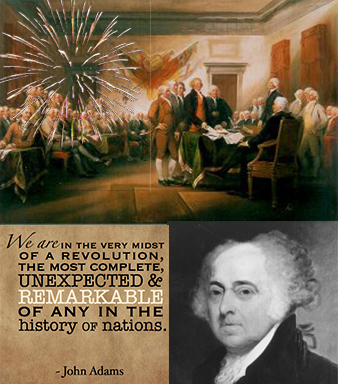
John Adams thought July 2 would be marked as a national holiday for generations to come
As he wrote his wife, “[Independence Day] will be the most memorable Epocha, in the History of America. I am apt to believe that it will be celebrated, by succeeding Generations, as the great anniversary Festival… It ought to be solemnized with Pomp and Parade with shews, Games, Sports, Guns, Bells, Bonfires and Illuminations from one End of this continent to the other from this Time forward forever more,” Adams wrote.
Officially, the Continental Congress declared its freedom from Great Britain on July 2, 1776. On that day in 1776 the Continental Congress approved a resolution for independence and delegates from New York were given permission to make it a unanimous vote. The resolution was submitted by delegate Richard Henry Lee of Virginia, declaring “That these United Colonies are, and of right ought to be, free and independent States, that they are absolved from all allegiance to the British Crown, and that all political connection between them and the State of Great Britain is, and ought to be, totally dissolved.”
Congress then needed to finalize a document explaining the move to the public, and it took two days for the Congress to agree on the edits. Hence, the annual celebration falls on July 4th. It was the actual document that was approved on July 4 which then had to be sent off to the printer.
Nearly a month would go by, however, before the actual signing of the document took place. First, New York’s delegates didn’t officially give their support until July 9 because their home assembly hadn’t yet authorized them to vote in favor of independence. Next, it took two weeks for the Declaration to be “engrossed”—written on parchment in a clear hand. Most of the delegates signed on August 2, but several—Elbridge Gerry, Oliver Wolcott, Lewis Morris, Thomas McKean and Matthew Thornton—signed on a later date. (Two others, John Dickinson and Robert R. Livingston, never signed at all.)
Adams was apprehensive about independence. While he tended to be with the changing of times, he was realistic about the cost of declaring independence. However, once he saw it was the right course in the long run to guarantee our natural rights as people and not just our legal rights as English citizens he argued for it incessantly and passionately to get it passed. He wrote to Abigail, his wife –“You will think me transported with Enthusiasm but I am not. — I am well aware of the Toil and Blood and Treasure, that it will cost Us to maintain this Declaration, and support and defend these States. — Yet through all the Gloom I can see the Rays of ravishing Light and Glory. I can see that the End is more than worth all the Means. And that Posterity will triumph in that Days Transaction, even although We should rue it, which I trust in God We shall not.”
We may see the last sentence of the Declaration of Independence in relationship to Adams- "And for the support of this Declaration, with a firm reliance on the protection of Divine Providence, we mutually pledge to each other our Lives, our Fortunes, and our sacred Honor.""
